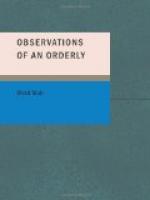XIV
SLANG IN A WAR HOSPITAL
Every ward in the hospital has a bathroom attached to it, but in addition to these there are two large bathrooms, each containing a number of baths, which are used by walking patients and also by the orderlies. The more recently built of these bathrooms is divided into private cubicles. In the older one the baths are on a more sociable plan, with no partition walls sundering them. The spectacle, in the “old” bathroom, when a convoy of walking cases has arrived, is one which should appeal to a painter. Clouds of steam fill the air, and through the fog you perceive a fine melee of figures, some half dressed, some statuesquely nude, towelling themselves or preparing to wash, or shaving at bits of mirror propped on the window-sills. Pink bodies wallow voluptuously in the deep porcelain-ware tubs, which are of the shape and superb dimensions of Egyptian sarcophagi. Sometimes a patient with a wounded arm, unable to help himself, is being soaped and sponged by an orderly; or you may see a cheerful soul, with an injured foot, balanced on the rim of the bath and giving himself all the ablutions which are practicable without the disturbance of bandages. No one who has frequented our bathrooms would ever doubt that the British Army loves cleanliness and hot water. Of cold water I cannot speak with the same enthusiasm.
A newly-arrived convoy of course monopolises the bathroom; but throughout the whole day, at almost any hour, you will find a patient or two here; for by the rule of the hospital it is allowable for any patient—once he has been given permission to take an unsupervised bath at all—to take a bath whenever he likes. Consequently it happens often that half a dozen orderlies may be bathing at the same time as half a dozen patients—and it need not be added that the occasion is one for pleasant chats and the barter of anecdotes. For this reason, if for no other, I always elected to use the “old” bathroom: the “new” one, with its closed cubicles, was less fruitful in conversations.
The “old” bathroom was the exchange (and perhaps the starting-point) of many of our hospital rumours. I imagine that every war hospital is a hotbed of rumours. Ours certainly was, and is. Amongst the orderlies there are incessant rumours about promotions, about the chances of the unit being sent abroad, about surprise inspections, about the imminent arrival of impossibly large convoys, about news—received privately by the Colonel over the telephone—of defeats or victories. Nine times out of ten the rumour turns out to be groundless. But this does not cause the output of rumours to diminish. Apparently the army is a prolific soil for rumours, inasmuch as they have a special name: a rumour is called a buzz. “Only a buzz” ("it’s only a rumour”) is an expression often heard on the lips of soldiers. In India it is sometimes “a bazaar buzz” (a rumour circulating in the bazaars); here it is, naturally, a bathroom buzz.




